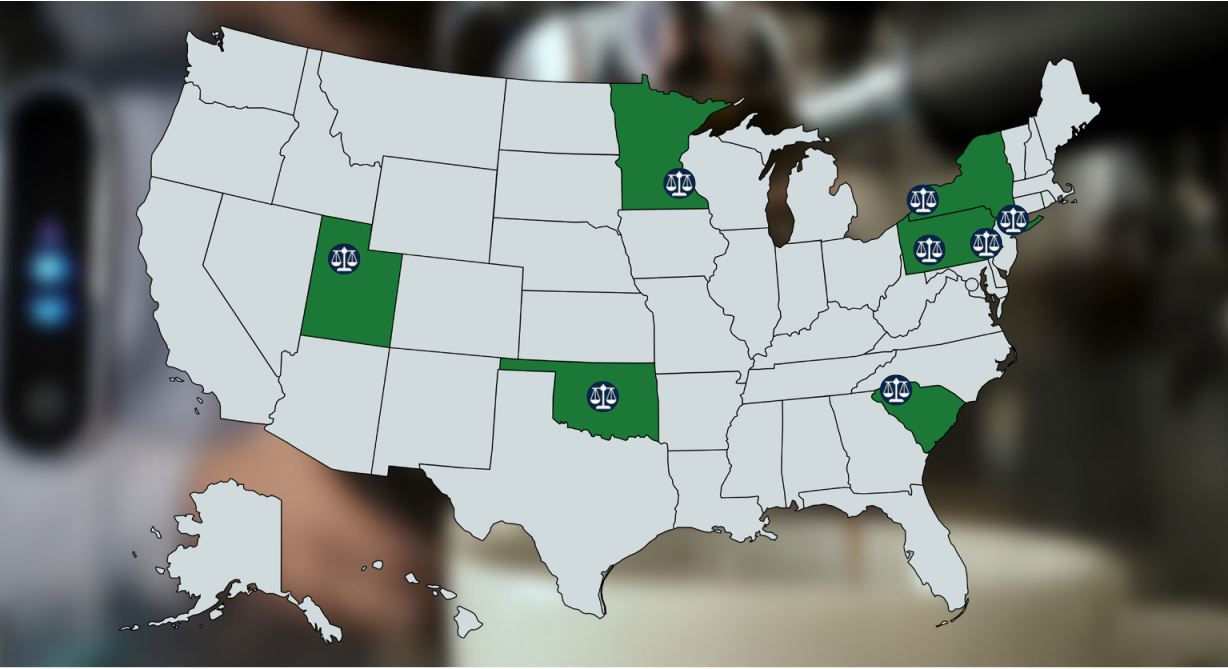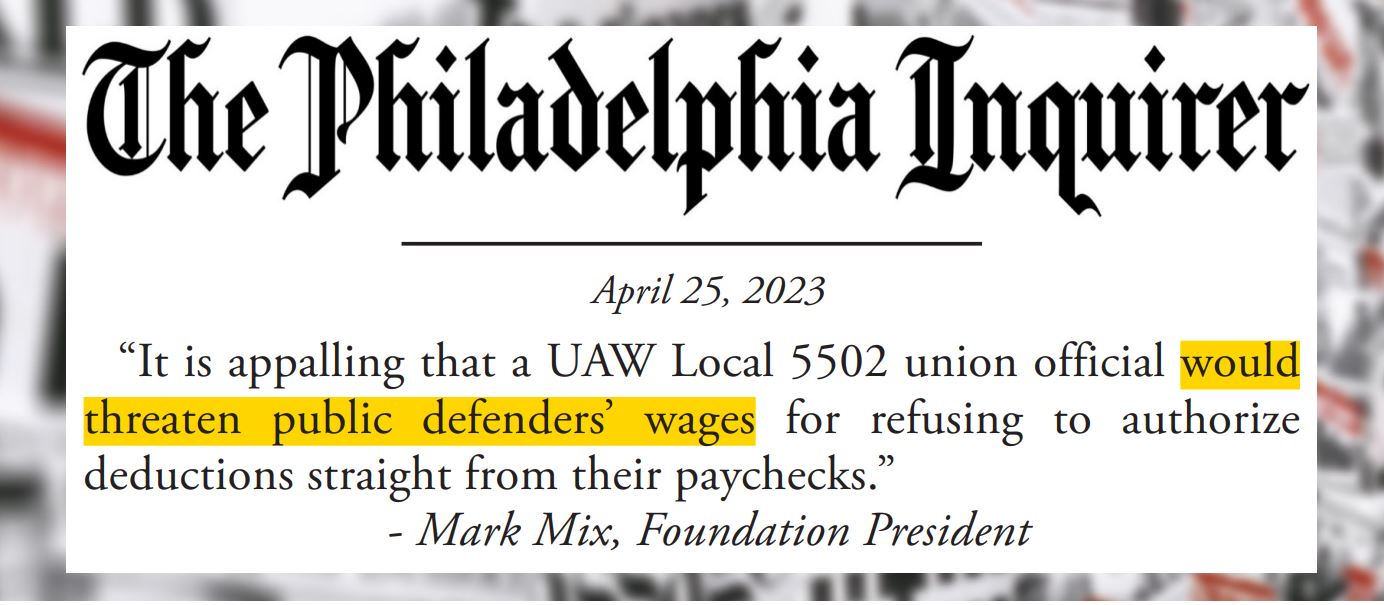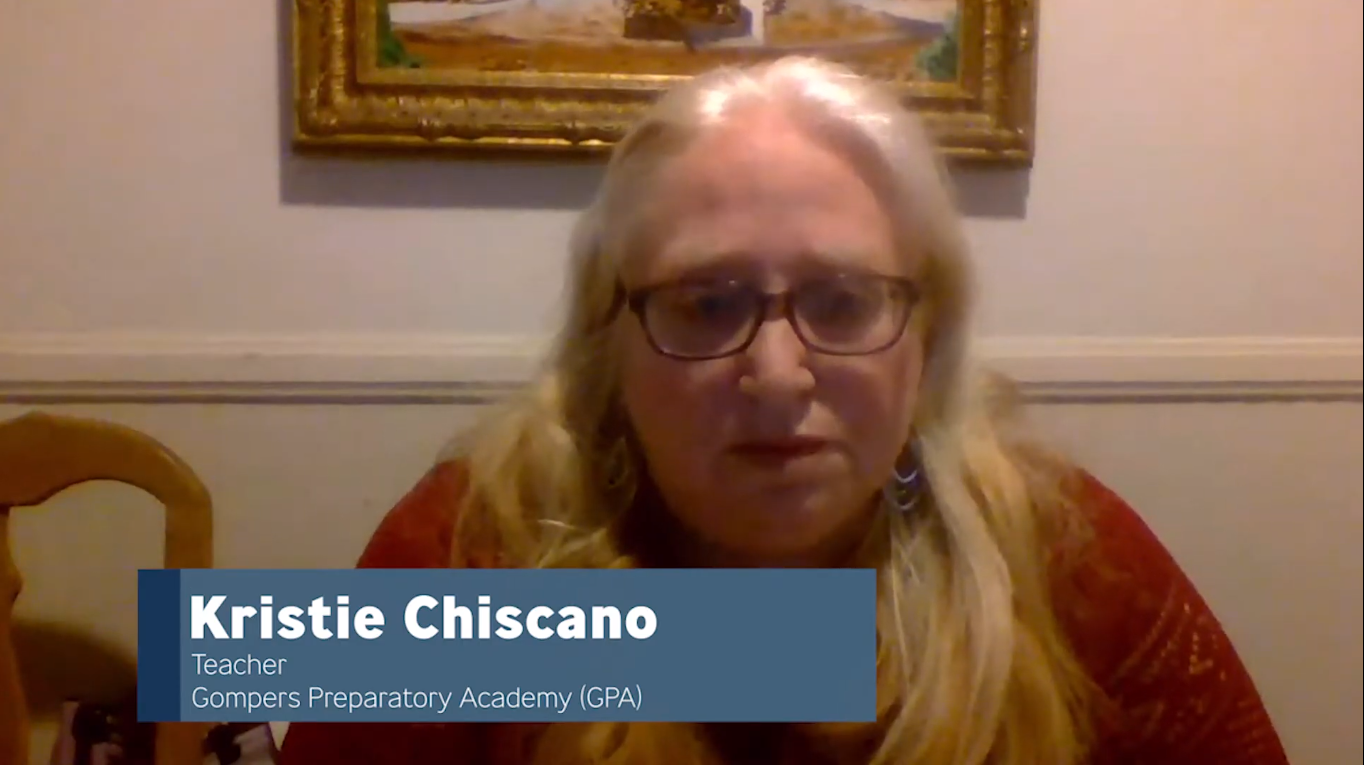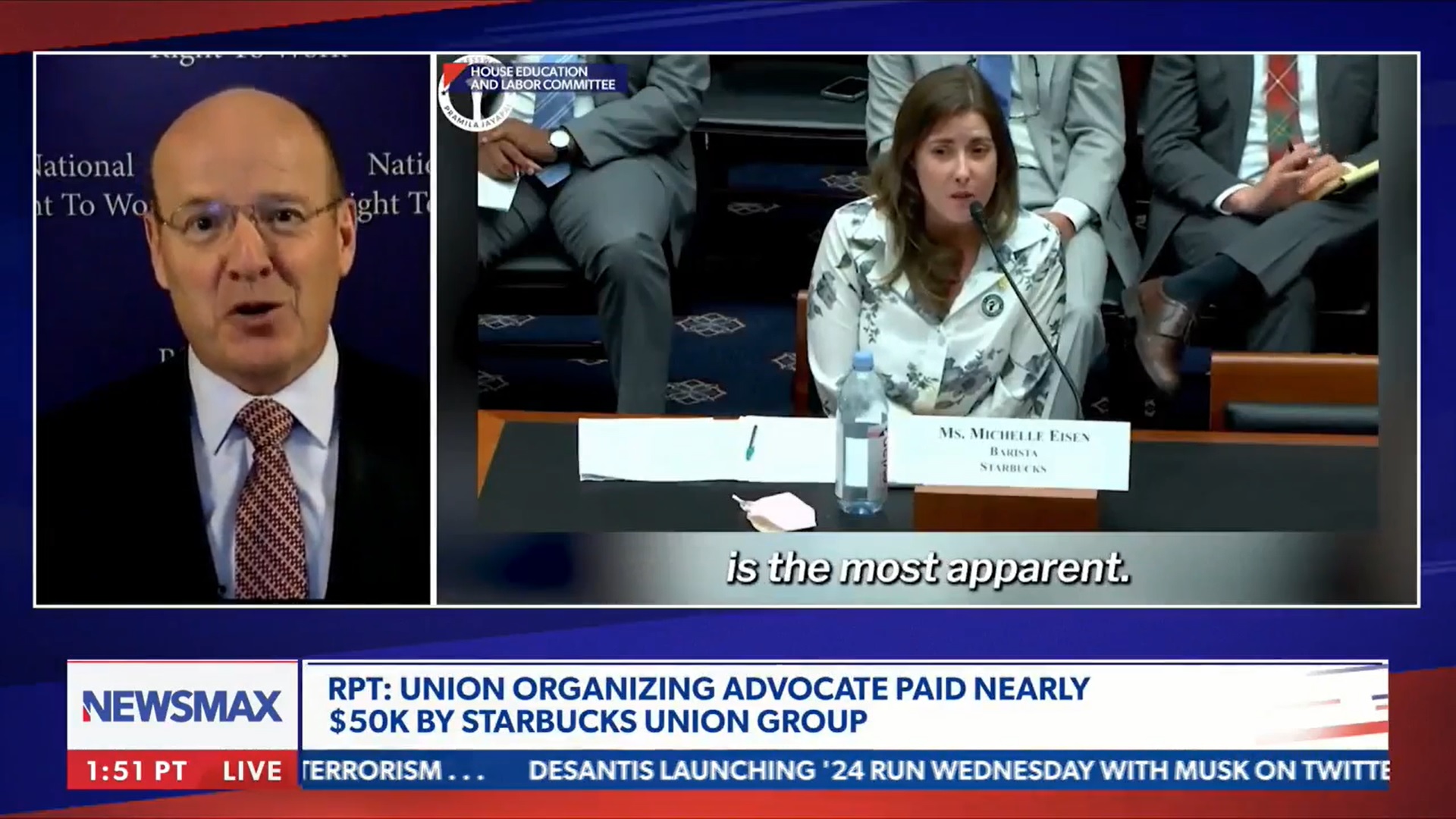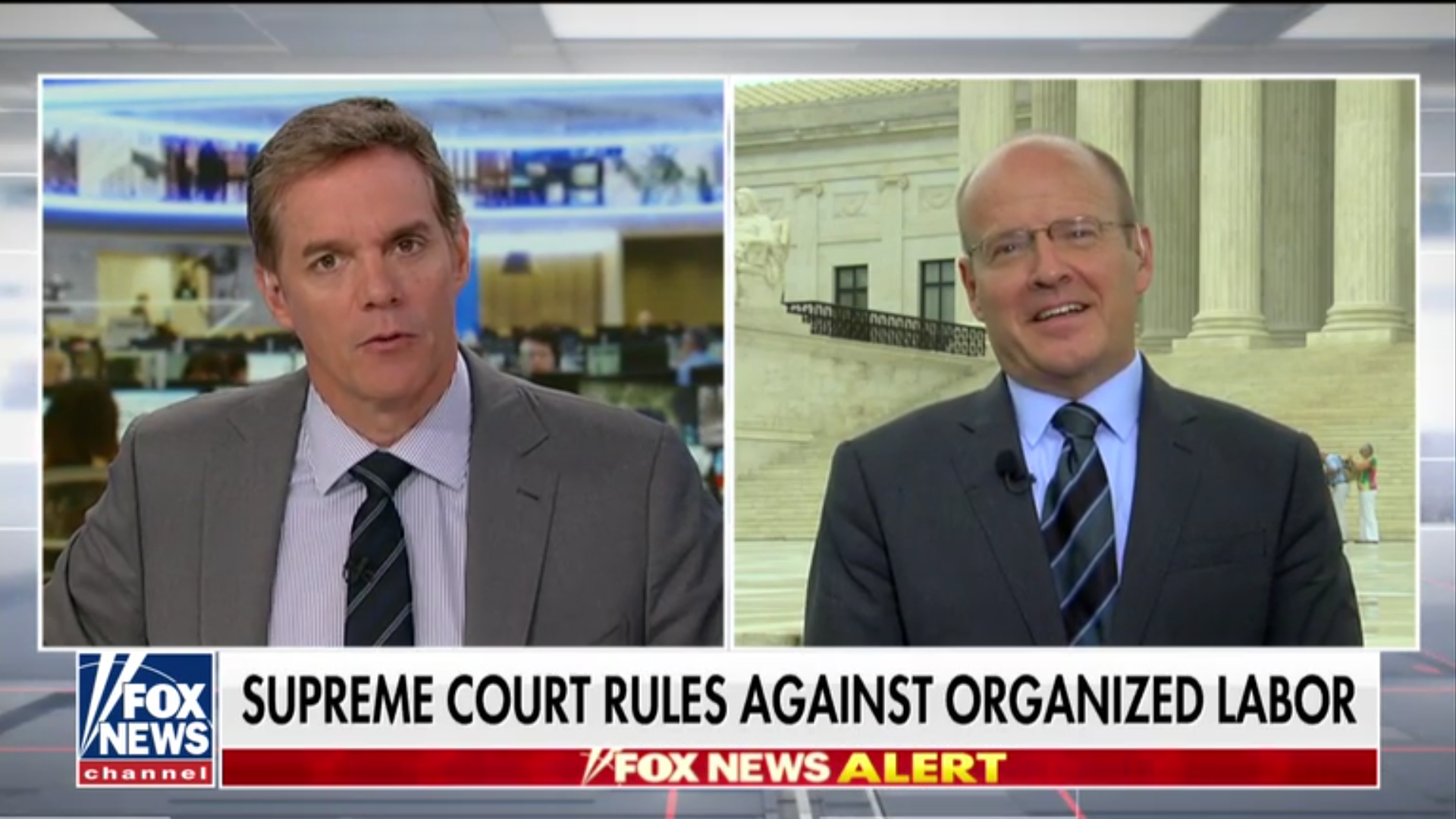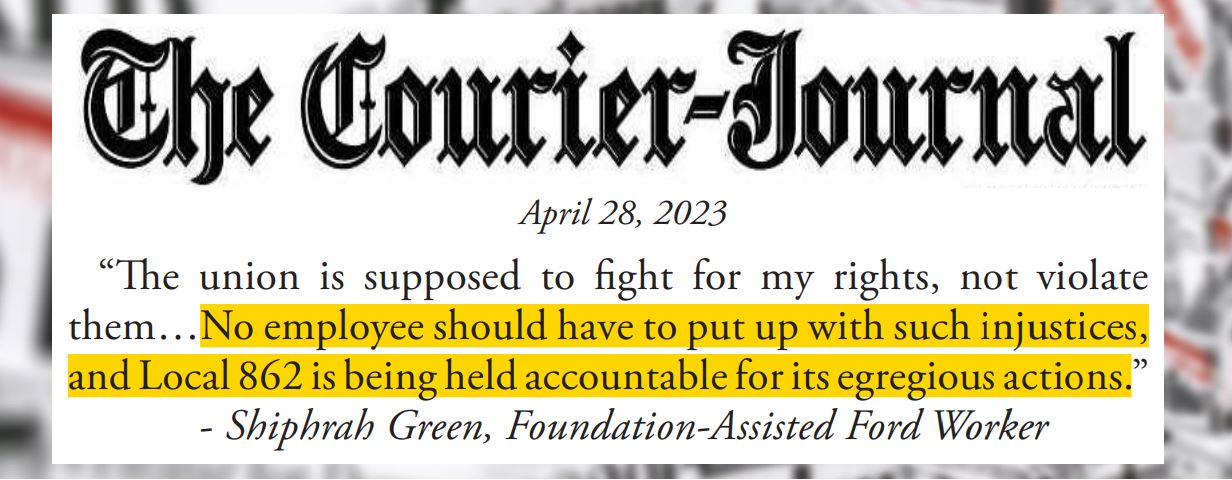UAW Strike: Foundation Notifies Workers of Their Right to Rebuff UAW Boss Strike Order
In September 2023, United Auto Workers (UAW) top boss Shawn Fain ordered a strike against all of the “Big Three” American car manufacturers for the first time in history.
The command created vast uncertainty for thousands of autoworkers across the country. The National Right to Work Foundation issued a legal notice as the strike began, informing workers of their rights to end their union memberships and return to work to support themselves and their families.
Right to Work experts also appeared on television shows across the country to explain these rights, and to remind Americans that UAW bosses’ agendas frequently don’t align with workers’ interests, as evidenced by the federal corruption scandal that has already resulted in the convictions of 11 UAW officials, including two former union presidents.
Watch Foundation Experts Break Down the UAW Strike:
Mark Mix on OANN “Tipping Point” with Kara McKinney, September 22, 2023
Mark Mix on Newsmax TV “The Chris Salcedo Show,” September 22, 2023
Mark Mix on NTD “Good Morning,” September 15, 2023
The article above is adapted from the National Right to Work Legal Defense Foundation’s bi-monthly Foundation Action Newsletter, November/December 2023 edition. To view other editions of Foundation Action or to sign up for a free subscription, click here.
Karma Catches Up to SEIU Officials as Philly Coffee Shop Workers Oust Union
The following article is from the National Right to Work Legal Defense Foundation’s bi-monthly Foundation Action Newsletter, November/December 2023 edition. To view other editions of Foundation Action or to sign up for a free subscription, click here.
Good Karma Café coffee shop employees vote out SEIU officials also opposed by many Starbucks workers
SEIU officials’ aggressive campaign targeting coffee shop employees across the country for union control is fast unravelling, as workers nationwide are now exercising their right to vote unions out, often with Foundation aid.
PHILADELPHIA, PA – Workers United (WU), the same union that runs Starbucks Workers United (SBWU) unions across the country, has been the subject of considerable media attention for its top-down organizing campaign against Starbucks. Little do people know that WU’s puppet masters at the Service Employees International Union (SEIU) have expended millions of dollars in hiring union activists to agitate for union control at these shops — including “salts,” paid union agents that pose as normal employees but often quit soon after they’ve achieved their actual goal of installing the union.
However, aggressive and deceptive WU union tactics did not stop Marco Camponeschi and his coworkers at two locations of Good Karma Café in Philadelphia from voting out the union with free legal aid from the National Right to Work Legal Defense Foundation.
Camponeschi submitted a petition in August asking the National Labor Relations Board (NLRB) Region 4 in Philadelphia to hold a vote to remove the union. The petition contained signatures from enough of his colleagues to prompt the election, and this September, the Good Karma employees voted to send WU officials packing.
Signs of SEIU “Salt” Tactics in Philly
“After the Workers United union was installed, there was a lot of employee turnover, and we soon found ourselves very short-staffed,” Camponeschi commented before the vote. Employee turnover after a union’s installation often indicates “salts” may have been present.
Pennsylvania, because of its lack of Right to Work protections for its private sector employees, permits union officials to make deals with employers that require workers to pay union dues just to stay employed. So by nixing the union, Camponeschi and his coworkers ended both forced union representation and the threat of forced dues. In states with Right to Work laws, in contrast, union membership and all union financial support are strictly voluntary and the choice of each individual worker.
Coffee Workers Leading Nationwide Charge to Boot Out Unwanted Unions
Since the beginning of this year, Starbucks employees in Manhattan, NY; Buffalo, NY; Pittsburgh, PA; Bloomington, MN; Salt Lake City, UT; Oklahoma City, OK; and Greenville, SC, have all sought free Foundation legal aid in pursuing decertification efforts against Workers United union bosses at the NLRB.
Outside of coffee shops, union decertification efforts are becoming much more common. Currently, the NLRB’s data shows a unionized private sector worker is far more likely to be involved in a decertification effort than their nonunion counterpart is to be involved in a unionization campaign. NLRB statistics also show that the number of worker-filed decertification petitions has increased each of the last three years.
“Workers United union officials seem to have a penchant for trying to expand their control over employees without regard for the employees’ interests,” commented National Right to Work Foundation Vice President and Legal Director William Messenger. “So it’s unsurprising that coffee employees nationwide are banding together to vote Workers United out.
“While we’re glad the Good Karma employees were able to successfully exercise their right to oust the unwanted union, it should be noted that NLRB officials across the country are blocking Starbucks employees from exercising that same right at the behest of Workers United union officials,” Messenger added. “Workers should be allowed to vote out unwanted unions, and the NLRB should not stifle that right based on union officials’ whims. That’s especially important as the Biden NLRB seeks to make several rule changes which will make it harder for workers to vote out union officials.”
Foundation-Backed Workers Fighting for Freedom from Unwanted Union Bosses
The following article is from the National Right to Work Legal Defense Foundation’s bi-monthly Foundation Action Newsletter, November/December 2023 edition. To view other editions of Foundation Action or to sign up for a free subscription, click here.
Victories come as Biden NLRB advances rule to block worker decertification votes
Seattle Mariners pro shop employees slammed UFCW union bosses out of T-Mobile Park by taking advantage of Foundation-backed rules that make union decertification votes easier. But the Biden NLRB is attacking those reforms.
WASHINGTON, DC – With National Right to Work Foundation staff attorneys aiding workers across the country in exercising their right to vote out union officials they don’t want, President Biden’s National Labor Relations Board (NLRB) is moving to undermine such efforts. The Biden NLRB is also fast-tracking policies that let union bosses sweep to power without even giving workers any chance to vote.
The Biden NLRB is pulling out all the stops to mandate the so-called “card check” process while eliminating workers’ ability to ask for a secret ballot vote. Card check lets union officials bypass the traditional union election process and pressure workers into signing union authorization cards that are later counted as “votes” for the union. Workers often report threats, intimidation, unwanted home visits, and union deception about the true meaning of the cards as part of a card check campaign.
The latest attack on workers’ election rights is the Biden NLRB’s pending rule to overturn Foundation backed-reforms to the election process adopted by the NLRB in 2020. The 2020 reforms, known as the Election Protection Rule, give workers a window of opportunity to petition for a secret ballot vote after a union imposes itself on workers without a secret ballot election. Foundation staff attorneys first established this protection in the 2007 Dana Corp case, and workers all over America used it until the Obama NLRB overturned Dana in 2010.
Seattle Mariners Employees Overwhelmingly Vote to Reverse UFCW Card Check
Since the 2020 Foundation-backed reforms reinstated the Dana process, workers have again used it to demand secret ballot elections to challenge union “representation” imposed through coercive card checks. In just the past few months, Foundation attorneys have assisted multiple groups of workers in exercising this freedom, and will continue to do so even in the face of Biden NLRB opposition.
This year, employees of the Seattle Mariners’ MLB pro shop obtained free Foundation legal aid to defend their effort to remove the United Food and Commercial Workers (UFCW) union, which had previously been installed through card check.
Regional NLRB officials granted the workers’ petition for a vote to remove the union based on the Election Protection Rule. But union lawyers argued on appeal that the Mariners employees’ election should be thrown out because of the so-called “voluntary recognition bar,” a pre-Election Protection Rule restriction that blocked workers from having a vote for up to a year or more after a card check.
The union’s appeal was dismissed based on the Election Protection Rule, and Mariners pro shop employees voted to send the UFCW packing by well over 80 percent.
California Paramedics Fight with Foundation Aid to Resuscitate Election Rights
Also on the West Coast, Michael Radan and his fellow paramedics and EMTs with the Manteca District Volunteer Ambulance Service in Groveland, CA; and Sonora, CA, petitioned for a secret ballot union decertification election shortly after Steelworkers union officials had swept themselves into the workplace via card check.
In August, Radan and his fellow paramedics and EMTs voted to remove the union. While Foundation attorneys are now defending Radan and his coworkers’ decision from election objections
levied by Steelworkers union bosses, the Election Protection Rule’s safeguards at least permitted the employees to vote.
As Decertifications Increase, Biden NLRB Makes Worker Free Choice Last Priority
Before the Rule, union officials could often use unproven or unrelated allegations of employer wrongdoing (also called “blocking charges”) to halt an election before ballots were even cast.
“That workers petition for secret ballot votes after union bosses make specious claims of majority support via card check shows that a card check isn’t truly reflective of workers’ will. The AFL-CIO’s own organizing manuals admit that workers often sign cards just to get union organizers ‘off their backs,’” commented National Right to Work Foundation President Mark Mix.
“All of this points to why the Election Protection Rule is so important — Big Labor should not have the power to subordinate workers’ free choice to union bosses’ thirst for power and dues revenue,” Mix added. “But as the Biden NLRB seeks to confer ever greater powers on union bosses, Foundation staff attorneys will continue to defend workers opposed to unionization, including by challenging the Biden NLRB in federal court.”
Philly Public Defender Beats Illegal UAW Dues Deduction Scheme
The following article is from the National Right to Work Legal Defense Foundation’s bi-monthly Foundation Action Newsletter, September/October 2023 edition. To view other editions of Foundation Action or to sign up for a free subscription, click here.
UAW boss threatened to reduce workers’ wages for not signing dues card
Philly Public Defender Brunilda Vargas surely didn’t feel “represented” by UAW bosses when they sought to reduce her and her colleagues’ pay just for not signing dues cards. Mark Mix expressed the outrageousness of this scheme to The Philadelphia Inquirer.
PHILADELPHIA, PA – Brunilda Vargas, a public defender for the City of Philadelphia, staunchly objected when United Auto Workers (UAW) Local 5502 union bosses sought to gain power over her and her colleagues at the Defender Association of Philadelphia.
After UAW union officials were installed in her workplace, things only got worse for her. A UAW union official threatened Vargas and her coworkers that, if they didn’t sign cards authorizing the direct deduction of union dues from their paychecks, their wages would be reduced. This threat was a blatant violation of federal law.
Vargas challenged UAW officials’ illegal demands with free legal aid from the National Right to Work Legal Defense Foundation. Union bosses quickly backed down, and in June entered into a settlement approved by National Labor Relations Board (NLRB) Region 4 which fully vindicates Vargas’ and her coworkers’ rights.
Public Defender Hits UAW with Federal Charges Following Intimidation
On April 18, 2023, Vargas filed her federal unfair labor practice charge with NLRB Region 4 for the threats made against her and her colleagues at the Defender Association of Philadelphia. UAW officials issued these threats against public defenders who chose not to sign automatic dues deduction authorization forms.
Even though Vargas works in the non-Right to Work state of Pennsylvania and can be forced to pay some union dues as a condition of employment, federal law prohibits forcing workers to authorize automatic dues deductions from their paychecks. Had Vargas lived in a Right to Work state, not only would she have the right to refrain from automatic dues deductions from her paycheck, but she could also refrain from financially supporting the union altogether. In Right to Work states, workers are fully protected from mandatory union membership and financial support, both of which must be completely voluntary.
Settlement Forces Union Bosses to Fully Abandon Illegal Threats
Now, pursuant to settlements, the UAW must email and post notices informing workers that the union will not work with the workers’ employer to reduce wages of nonmembers that do not sign automatic dues deductions forms. The union must also not suggest failure to sign a dues deduction card could lead to a worker’s termination. Finally, the union must not coerce or restrain individuals from expressing their rights under Section 7 of the National Labor Relations Act.
“[UAW] will not threaten objecting non-members that we will notify the Employer it can seek refunds of their contractual salary increases if they do not sign a dues deduction authorization form. Neither employees nor members are legally required to execute a dues deduction authorization form,” the notice reads.
“While we are happy that we were able to help Vargas and her coworkers fight UAW misconduct, this instance is but the tip of the iceberg when it comes to UAW malfeasance,” commented National Right to Work Foundation Vice President Patrick Semmens. “The recent federal probe into UAW officials stealing and misusing workers’ money has sent multiple top UAW bosses to jail, and uncovered a shocking culture of contempt for workers’ rights.”
“Fortunately, the numerous victims of UAW boss abuses need not fight alone,” continued Semmens. “They have an ally in the National Right to Work Foundation.”
Victory: San Diego Charter School Educators Vote Out Teacher Union Bosses
The following article is from the National Right to Work Legal Defense Foundation’s bi-monthly Foundation Action Newsletter, September/October 2023 edition. To view other editions of Foundation Action or to sign up for a free subscription, click here.
SDEA officials stonewalled vote at charter school for years with “blocking charges” and pressure from elected officials
Kristie Chiscano kick-started the first effort at Gompers to remove the SDEA union. She witnessed firsthand that union control was ruining the independent nature of the charter school.
SAN DIEGO, CA – When San Diego Education Association (SDEA) union officials rose to power in 2019 at Gompers Preparatory Academy (GPA), educators and parents were rightfully concerned about what impact it would have on students’ progress and well-being.
Gompers had made an impressive transition to being a union-free charter school in 2005 after years of being plagued by unresponsive union bureaucracies, violence, high teacher turnover, and poor academic achievement. Teachers who feared that union monopoly control would allow such problems to creep back into Gompers quickly began an effort to vote out the union.
“I chose to work at a school that didn’t have a union, and now they’ve come in and they’re running everything about my contract and my work,” Kristie Chiscano, then a Gompers chemistry teacher and proponent of the decertification effort, said at the time.
While union stall tactics derailed Gompers educators’ 2019 effort to oust the union, Gompers educators didn’t give up. A majority of Gompers teachers backed another petition asking the California Public Employment Relations Board (PERB) for a vote to remove the union in 2023. Now, after years of legal maneuvers from union officials, Gompers educators have successfully ousted the SDEA with free legal aid from the National Right to Work Foundation.
SDEA Officials Used Spurious Charges to Block Earlier Teacher Effort
“There is definitely a lot more joy that’s going to be in classrooms now, instead of a burden with the union,” Cynthia Ornelas, a sixth grade Gompers teacher, told KPBS. “The union was making decisions for us, oh my goodness! We never knew what they were deciding because they didn’t communicate with teachers.”
Gompers teachers’ first effort to eliminate the SDEA union stemmed from an October 2019 petition that had the backing of a significant number of teachers, more than required by state law. However, SDEA union bosses averted the election by filing so-called “blocking charges” containing allegations of employer misconduct.
Union officials often manipulate “blocking charges” at the PERB and other state and federal labor relations agencies to stifle worker attempts to eliminate unpopular union “representation.”
As Foundation attorneys defended Gompers educators’ first petition, they also challenged a regulation requiring PERB agents and attorneys to accept union bosses’ “blocking charge” allegations as true. This regulation almost guarantees union defeat of any worker attempt to vote a union out.
Despite the PERB never holding a hearing into whether SDEA union bosses’ claims had any merit or whether they were related to the workers’ dissatisfaction with the union, PERB officials denied a decertification election to Gompers educators in October 2020.
Aside from legal maneuvers, union officials used intimidation and pressure to avoid being voted out. Chiscano and another Gompers educator filed charges maintaining that SDEA agents targeted them on social media for opposing the union hierarchy. California law makes it illegal for union officials to intimidate or retaliate against employees who exercise their right to refrain from union membership. Union-label California legislator Lorena Gonzalez, then an assemblywoman and now a top California AFL-CIO official, even wrote a screed to Gompers management that attacked the National Right to Work Foundation for simply providing legal aid to Gompers educators.
Teachers’ Long Struggle Exposes Massive Power of CA Public Sector Unions
Gompers educators submitted the March 2023 petition at the earliest time permitted by California labor regulations, which immunize union officials from employee-led decertification efforts for all but a tiny window while union contracts are active. Now, nearly four years after their original effort began, Gompers educators are finally free from union control.
“Gompers educators witnessed that SDEA union officials were not acting in the best interests of the students or the school community at large, and they fought courageously to bring back the independent environment that made Gompers a success,” commented National Right to Work Foundation President Mark Mix. “However, Gompers teachers shouldn’t have had to fight as long or as hard as they did simply to exercise their rights. No special interest group in California, or in America, should wield this kind of power over teachers and the public education system.
Starbucks Workers Nationwide Rising Up Against Union Representation
The following article is from the National Right to Work Legal Defense Foundation’s bi-monthly Foundation Action Newsletter, September/October 2023 edition. To view other editions of Foundation Action or to sign up for a free subscription, click here.
Foundation provides free legal aid to Starbucks employees looking to remove unions
Mark Mix appeared on Newsmax TV this summer to discuss reports that union bosses spent millions to infiltrate Starbucks workforces with union agitators, many of whom hid their affiliations from their coworkers and even Congress.
WASHINGTON, DC – Union bosses and their bought-and-paid-for political allies like Sen. Bernie Sanders and Rep. Alexandria Ocasio-Cortez have been touting the unionization of some Starbucks locations as a breakthrough for Big Labor. But Starbucks employees under union control are increasingly realizing the drawbacks of having union bosses in the workplace and are banding together to say “NO” to union power.
In the last few months, employees at Starbucks locations in Manhattan and Buffalo, NY, Pittsburgh, PA, Minneapolis, MN, and Salt Lake City, UT, have all filed decertification petitions at the National Labor Relations Board (NLRB), requesting the agency hold elections at their stores to remove the Starbucks Workers United (SBWU) union. All have received free legal aid from National Right to Work Foundation attorneys.
But SBWU union officials — boosted by operatives from their notorious puppeteer, the Service Employees International Union (SEIU) — are fighting tooth and nail to remain in power at Starbucks locations where workers want them gone.
SBWU union officials are flooding the National Labor Relations Board (NLRB) with unrelated charges of alleged employer wrongdoing in an attempt to stall these decertification petitions.
Starbucks Worker’s Brief Blasts NLRB Double Standard on Elections
In June, Foundation staff attorneys filed a Request for Review with the NLRB in Washington, D.C., as a part of a case for Buffalo Starbucks worker Ariana Cortes. This request asks the Board to reverse an NLRB Regional Director’s order dismissing Cortes and her coworkers’ majority-backed petition for a decertification election on whether to remove SBWU.
The filing emphasizes that the employees want an election to remove a union that lacks the support of a majority of the workers. Employee free choice is a fundamental principle of the National Labor Relations Act (NLRA), and by denying these employees an election, the Board is undermining free choice.
The brief also observes the basis for blocking the vote is contradicted by the NLRB allowing union-backed certification elections to proceed with little or no delay. The result is that the SEIU is like a roach motel, easy to enter but impossible to leave.
Efforts to Boot SBWU Increasing Across Country
“They have treated us like pawns, promising us that we could remove them after a year if we no longer wanted their representation, and are now trying to stop us from exercising our right to vote,” Cortes said of SBWU union bosses. “It’s obvious they care more about power and control than respecting our individual rights.”
Cortes and her coworkers are not the only workers to become disillusioned with SBWU.
Foundation attorneys recently began representing employees at Starbucks branches at Pittsburgh’s Penn Center East, the Mall of America in Bloomington, MN, and Cottonwood Heights in the Salt Lake Valley, UT, who also submitted petitions demanding decertification votes on SBWU union officials.
“SBWU union bosses have not looked out for the interests of me and my fellow employees,” commented Pittsburgh Starbucks employee Elizabeth Gulliford. “We simply want to exercise our right to vote out a union that we don’t believe has done a good job, and both SBWU and Starbucks should respect that right and our final decision.”
The Starbucks employee-led decertification attempts all took place about one year after union power was installed at these stores — meaning workers seized the opportunity to decertify nearly as soon as legally possible. Federal labor law prevents workers from exercising their right to remove an unpopular union for at least one year after the union is installed.
Biden NLRB Propping Up Union Boss Attempts to Squash Votes
“It is becoming increasingly obvious that SBWU officials seek to extend their power over as many Starbucks workers as possible, with little regard for the employees they claim to ‘represent,’” commented National Right to Work Foundation Vice President and Legal Director William Messenger. “And as we’ve seen in Ms. Cortes’ case in Buffalo, Biden NLRB officials are more than willing to indulge union bosses’ legal maneuvers to cling onto power even when workers have clearly had enough.”
“SBWU officials should not seek to disenfranchise the Starbucks workers they claim to ‘represent’ as those workers try to flee the SBWU’s clutches,” Messenger added. “The union officials’ conduct shows why fundamental changes must be made to the NLRB’s election processes to better protect employee free choice.”
After Janus, Foundation Continues Fight to Expand Freedom for Public Employees
The following article is from the National Right to Work Legal Defense Foundation’s bi-monthly Foundation Action Newsletter, September/October 2023 edition. To view other editions of Foundation Action or to sign up for a free subscription, click here.
Building off Janus, CUNY professors’ lawsuit could end forced ‘representation’ powers
The Foundation’s historic Janus victory was a serious blow to public sector union bosses’ coercive power in its own right. But it also opened the door for efforts to free public workers completely from forced dues and forced representation.
NEW YORK, NY – Up until 2018, union bosses had the power to force millions of government workers to pay union dues or fees just to keep their jobs. While such an enormous privilege was not only a gross violation of workers’ free association rights, it also provided a steady stream of forced dues to union bosses, which contributed to their outsized influence over the government and our political system.
Union officials’ forced-dues power over public sector workers crumbled on June 27, 2018, when National Right to Work Foundation staff attorneys won the landmark Janus v. AFSCME decision at the U.S. Supreme Court. A majority of the Justices agreed with Foundation attorneys that every American public sector worker has a First Amendment right to abstain from paying dues to an unwanted union.
On the fifth anniversary of Janus, its impact can’t be overstated. Between the Janus decision itself and over 50 follow-up cases, Foundation staff attorneys have enforced the rights of over 500,000 employees nationwide. Meanwhile, studies find that independent-minded workers are withholding over $700 million in formerly mandatory dues and fees from public sector union bosses every year as a result of the decision.
Of course, Foundation staff attorneys continue to fight to defend, enforce, and expand on the landmark decision.
New Challenge to Forced ‘Representation’ Reaches Court of Appeals
In an ongoing Foundation-assisted case, Goldstein v. Professional Staff Congress (PSC), six City University of New York (CUNY) professors seek to knock down the final pillar of coercive union power in the public sector — union bosses’ power to force their one-size-fits=all “representation” on workers who don’t want it.
A brief recently filed at the Second Circuit Court of Appeals for the professors argues that PSC union officials are violating the professors’ First Amendment rights by forcing them to accept the union’s monopoly control and “representation.”
Professors’ Lawsuit: Janus Already Noted Dangers of Monopoly Bargaining
The professors have found the actions of PSC union bosses and adherents to be “anti-Semitic, anti-Jewish, and anti-Israel,” and have even reported union-instigated bullying and threats targeted against them.
The professors’ opening brief at the Second Circuit maintains that the Supreme Court already acknowledged in the Janus decision that public sector monopoly bargaining is “a significant impingement on associational freedoms,” and argues that New York State’s Taylor Law authorizes such bargaining in violation of workers’ rights.
“If the First Amendment prohibits anything, it prohibits the government from dictating who speaks for citizens in their relations with the government,” reads the brief.
The case, which will likely head to the U.S. Supreme Court no matter how the Circuit Court rules, could set a nationwide precedent forbidding public sector monopoly bargaining, just as Janus prohibits forced dues in all public sector workplaces. The combination of both Foundation-won precedents would guard public workers nationwide from both forced dues and forced representation.
Foundation Brief Defends State Law to Fortify Janus
The Janus victory also motivated freedom-loving state legislators to take extra measures to ensure workers’ First Amendment rights under Janus are being enforced.
In Indiana, a reform now forbids public employers from using taxpayer-funded government payroll systems to deduct union dues without a worker’s explicit consent. Public employers must obtain yearly consent from workers who wish to have union dues taken from their paychecks, and must also ensure that workers have notice of their constitutional right not to fund union activities. Unsurprisingly, dues-hungry Anderson Federation of Teachers (AFT) union officials sued the state to block these commonsense protections.
Foundation attorneys joined the fight recently to defend Indiana’s laws. A Foundation brief in the Seventh Circuit Court of Appeals urges the court to overturn a lower court’s injunction of these reforms, citing Seventh Circuit precedent.
Foundation attorneys helped successfully defend a similar law in West Virginia in 2021, which the West Virginia Supreme Court upheld on the basis that union bosses “have no constitutional entitlement to employees’ money or to the employer’s administration of union dues deduction schemes.”
Federal Courts Must End Union Monopolies
“Janus was a great triumph for American public workers’ freedom, but it was only a step toward the ultimate goal of freeing public workers from all unwanted union coercion,” commented National Right to Work Foundation Vice President Patrick Semmens. “No American worker should be forced to associate with union officials and union members that openly oppose their interests, including through attacks on their culture and religion as the plaintiffs in Goldstein have harrowingly experienced.”
“It’s encouraging to see that states like Indiana have stepped up to protect workers’ Janus rights,” Semmens added. “But ultimately, after recognizing in Janus and older precedents that union monopoly bargaining abridges workers’ free association rights, it’s high time for federal courts to end this enormous government-granted power for union bosses once and for all.”
Foundation Asks Supreme Court to Take on Widespread Janus Violations
The following article is from the National Right to Work Legal Defense Foundation’s bi-monthly Foundation Action Newsletter, November/December 2023 edition. To view other editions of Foundation Action or to sign up for a free subscription, click here.
Brief: Pending case should be used to underscore need to obtain workers’ consent to dues
In 2019, Alaska Gov. Mike Dunleavy took proactive steps to protect Janus, but dues-hungry ASEA union bosses fought his actions all the way up to the Supreme Court.
WASHINGTON, DC – The National Right to Work Foundation’s victory in the 2018 Janus v. AFSCME Supreme Court case set a monumental First Amendment precedent. In Janus, the Justices recognized that no public sector worker can be forced to pay union dues as a condition of employment, and that unions cannot deduct union dues from a public sector worker’s wages unless that worker waives his or her Janus rights.
Now the Foundation is asking the U.S. Supreme Court to, five years after Janus was issued, take another case to clarify and fortify the Janus precedent against numerous misinterpretations by greedy union officials, union-backed state politicians, and, most worryingly, some lower court judges.
Alaska Takes Lead on Janus Rights Only to Face Union Boss Resistance
The Foundation’s brief asks the Supreme Court to weigh in on an Alaska lawsuit that started when union officials sought to nullify Alaska state officials’ attempt to fully protect the First Amendment rights of public employees. Union officials challenged the state’s arrangement which ensured that the state didn’t deduct dues from any public employee who had not knowingly waived their rights under Janus.
After the Janus decision, Alaska Gov. Mike Dunleavy issued an executive order requiring the state to obtain proof of consent from workers each year to deduct union dues from their paychecks. The requirement was designed to prevent union bosses from deducting dues money from the wages of a worker who didn’t fully understand their legal rights under Janus. Many workers, for example, may have authorized dues deductions years before the Supreme Court recognized that mandatory payments to unions as a condition of government employment violate the Constitution.
Unwilling to comply with even this modest check on their power to deduct union dues directly from government employees’ paychecks, Alaska State Employees Association (ASEA) officials battled the State of Alaska in state court. Eventually, ASEA union lawyers were able to get the state’s highest court to block the arrangement. But the Supreme Court has the ability to fix the Alaska State Supreme Court’s misinterpretation of Janus.
Following the State of Alaska’s petition asking the U.S. Supreme Court to hear arguments in the case, Foundation attorneys filed a legal brief of their own, urging the Justices to uphold Alaska’s safeguards on Janus and correct the misinterpretations of Janus made by an increasing number of courts and state governments around the country.
Brief: States and Courts Are Ignoring Janus, Need to Be Reined In
The Foundation’s argument notes that, after the Janus decision, at least seventeen states either changed their laws to require government employers to enforce union boss-invented restrictions on when employees can stop union dues deductions, or enforced dues deduction restrictions already on the books. Both lead to unacceptable restraints on public sector workers’ Janus rights, the amicus brief argues.
The amicus brief further contends that lower courts, especially the Ninth Circuit Court of Appeals with jurisdiction over Alaska, have misinterpreted Janus by not mandating government employers notify public workers of their Janus rights before taking union dues from their paychecks. For a waiver of one’s rights to be effective, a person must know what those rights are — just as police officers “Mirandize” suspects they arrest by informing them of their “right to remain silent.”
Union Bosses Value Dues-Funded Politicking Over Public Servants’ Rights
The amicus brief also points out that the Ninth Circuit has issued decisions that free public employers from any obligation to prove that union bosses obtained authentic consent from workers before dues are taken from their wages — opening the door for forged or fake dues deduction cards.
“Unless the Court grants review and breathes new life into Janus’ waiver requirement, unions and their government allies will continue to severely restrict the right of millions of employees to stop subsidizing union speech,” the amicus brief concludes.
“Public sector union bosses, who prize their own dues-funded political influence far above the individual rights of the employees they claim to ‘represent,’ have tried everything in their power to dodge the Janus ruling and keep siphoning money from workers,” commented National Right to Work Foundation Vice President Patrick Semmens. “The Supreme Court
has an opportunity in the State of Alaska’s case to set the record straight and ensure that workers’ free association rights can’t simply be molded according to their own schemes.”
Foundation Defends Michigan Workers with Forced Dues Looming
The following article is from the National Right to Work Legal Defense Foundation’s bi-monthly Foundation Action Newsletter, July/August 2023 edition. To view other editions of Foundation Action or to sign up for a free subscription, click here.
With Right to Work repeal law passed, workers seek to escape mandatory payments
Michigan legislators’ unpopular decision to repeal the state’s Right to Work law helped prompt Mary Soltysiak and her coworkers’ move to vote out the IAM union.
LANSING, MI – Despite poll after poll showing 70 percent of Michiganders wanted Michigan’s decade-old Right to Work law left in place, Gov. Gretchen Whitmer and union cronies in the Michigan Legislature voted to strip Wolverine State workers of their right to refrain from funding unwanted union bosses in March. In response, the Foundation sprang into action, issuing a Special Legal Notice to Michigan workers advising them of their legal options as the state transitions to a forced-dues regime. The notice reminded workers that, despite what union bosses may claim, the state’s Right to Work law remains in effect until 90 days after the legislative session ends later this year — and also what they can do in advance of forced dues being legal again. Unsurprisingly, given Right to Work’s popularity even among union households, Michigan workers are stepping up and taking action to defend their rights against coercive unionism.
Michigan Workers Battle Forced-Dues Schemes Ahead of Repeal
For example, Foundation attorneys are currently assisting Grand Rapids-area Kroger employee Roger Cornett’s challenge to an illegal dues scheme perpetrated by United Food and Commercial Workers (UFCW) union officials. Cornett hit UFCW bosses with federal charges this May, accusing them of ignoring a letter in which he exercised his right to cut off dues deductions from his paycheck. Cornett’s charges also maintained that UFCW bosses sought to seize money from him using a form that blatantly violates existing federal law. Cornett’s charge says the form is illegal because of its “dual purpose” nature, meaning just one signature confusingly locks a worker into both membership and dues deductions. Federal law requires any authorization for union dues deductions to be voluntary and separate from a union membership application. UFCW bosses’ contempt for longstanding federal protections in Cornett’s case likely indicates how aggressively union officials will pursue forced dues under a non-Right to Work regime. The Foundation’s legal notice also counsels workers that they can avoid forced-dues arrangements entirely by petitioning the NLRB to hold “decertification elections” at their workplaces, in which workers can vote unpopular unions out.
Legal Notice Counsels Workers of Right to Vote Out Unwanted Unions
Mary Soltysiak, who opposes forced dues, heard news of the upcoming repeal and filed a petition to decertify the International Association of Machinists and Aerospace Workers (IAM) District Lodge 60/Local Lodge 475 union with free legal aid from Foundation staff attorneys. Soltysiak and her colleagues work at Terryberry, a manufacturing firm in Grand Rapids, MI.
Soltysiak stated that she and some of her colleagues “contacted [a Foundation attorney] and filled out paperwork to get out of paying union dues around the year 2018 because of the Right to Work . . . law.”
“The union has done nothing but hurt my paycheck and my vacation hours,” Soltysiak added.
Soltysiak and her coworkers achieved victory this May, when the NLRB certified their majority vote ousting the IAM union. Hopefully, their success portends the future success of the growing number of workers in Michigan and across the country looking to decertify the unions in their workplaces.
Foundation Also Defending Public Sector Right to Work Protections
As noted in the Foundation’s legal notice, the Michigan Right to Work repeal does not affect public sector Michigan employees. Under the Foundation-won Janus v. AFSCME Supreme Court decision, no public worker in America can be forced to subsidize a union as a condition of employment. But, as the repeal is looming, Michigan public sector union officials are nonetheless seeking to undermine public employees’ freedom to refrain from union support through so-called “fee-for-grievance” schemes.
This April, the Foundation submitted a brief in the Michigan Supreme Court case Technical, Professional and Officeworkers Association of Michigan (TPOAM) v. Renner, in which TPOAM officials are trying to enforce a “fee-for-grievance” policy against Saginaw County employee Daniel Renner. Under it, union bosses strip nonmember public employees of any power to file grievances themselves, and instead mandate that they pay fees sometimes exceeding yearly union dues to use the union’s grievance system.
Michigan legislators’ unpopular decision to repeal the state’s Right to Work law helped prompt Mary Soltysiak and her coworkers’ move to vote out the IAM union.
In the brief, Foundation staff attorneys refute the union’s claims for this newfound power, stating that “fee-for-grievance” schemes were never authorized by the Michigan Legislature and are inconsistent with federal law.
Foundation Attorneys Will Defend Worker Freedom in Michigan
“Michigan union officials and their allies in the state legislature have contempt for workers’ individual rights that knows no bounds,” commented National Right to Work Foundation Vice President and Legal Director William Messenger. “That was made clear by the repeal of the popular Right to Work law, and the attempt to undermine Right to Work protections for public sector employees which are safeguarded by the First Amendment under the Foundation’s Janus U.S. Supreme Court victory.”
“Michigan workers have a long road ahead to restore their rights against union coercion, but Foundation attorneys are fighting alongside these workers, and will continue to fight until no Michigan worker can be forced to pay union bosses they disapprove of just to keep a job,” Messenger added.
Foundation-Backed Workers Notch Victories Over Dues-Hungry UAW Bosses
The following article is from the National Right to Work Legal Defense Foundation’s bi-monthly Foundation Action Newsletter, July/August 2023 edition. To view other editions of Foundation Action or to sign up for a free subscription, click here.
UAW caught using threats and coercion to illegally seize workers’ dues
Ford employee Shiphrah Green excoriated UAW bosses in the Louisville Courier Journal over their blatant disregard for her rights. Foundation attorneys are helping her and others battle the notoriously corrupt union.
LOUISVILLE, KY – United Auto Workers (UAW) union officials have a well-deserved reputation for looking out for their own interests while throwing rank-and-file workers under the bus. The most prominent recent example is the corruption and embezzlement scandal, in which federal investigators revealed that UAW officials had siphoned millions of dollars in workers’ money to fund opulent golf vacations in luxury condos and private villas, spa and amusement park visits, $60,000 cigar-buying sprees, and much more.
But the federal corruption probe that led to eleven top UAW bosses pleading guilty, including former union presidents Gary Jones and Dennis Williams, is hardly the only time greedy UAW bosses abused their government-granted monopoly bargaining powers.
In a series of recent cases brought by National Right to Work Foundation staff attorneys against the UAW, workers are utilizing the Foundation’s free legal aid to vindicate their rights in the face of illegal dues demands by UAW officials.
Foundation-won Settlements Force UAW to Return Money to KY, IA Workers
Shiphrah Green, an employee of Ford Motor Company’s Louisville Assembly Plant, prevailed over UAW Local 862 bosses with free Foundation legal aid in April. UAW bosses were forced to settle and return money they had unlawfully taken from Green’s pay.
Green’s federal charges against the union maintained not only that UAW officials had made her jump through unnecessary hoops to exercise her right to cut off union dues, but also that UAW bosses made threats against her job when she tried to resign, with one union official warning her “if it were up to me, you’d lose your job for leaving the union.” Green’s settlement also forced UAW officials to refrain from such illegal threats in the future.
Meanwhile in Iowa, four employees of air filter manufacturer Donaldson won a recent settlement in which UAW officials were required to return over $1,000 in illegally-seized dues.
In each Donaldson worker’s case, UAW bosses had either refused to stop dues deductions despite producing no original documentation showing the workers had consented to such deductions in the first place, or had kept seizing money after an employee resigned union membership and revoked authorization to deduct dues, which should have been effective in stopping the flow of dues.
Because Ms. Green and the Donaldson workers reside in Right to Work states, the Foundation-won cases mean they will be free from all union financial support going forward.
Philly Public Defender Hits UAW with Charges
Even in non-Right to Work states where union officials have the power to compel workers to pay some fees under threat of termination, UAW bosses still go far beyond what is legal in their greedy forced-dues demands.
For example, Foundation staff attorneys recently filed a case for Philadelphia public defender Brunilda Vargas. Vargas, a vocal opponent of the UAW’s unionization drive, was told by UAW organizers that the union would reduce her and her coworkers’ wages if they did not grant the union the power to automatically deduct union dues directly from their paychecks.
Not only is the threat illegal, but further, employees can never be required to authorize automatic dues deductions from their paychecks under long-established federal law. This is true even in a state like Pennsylvania where workers lack the protection of a Right to Work law. Vargas’ charge, filed in June, is now being investigated.
“American workers likely have a plethora of reasons for wanting nothing to do with UAW union officials, including but not limited to the dizzying corruption in the union that has led to so many union officials going to prison,” commented National Right to Work Foundation Vice President Patrick Semmens. “As Foundation attorneys have experienced, UAW officials will often resort to clearly illegal methods to squeeze money out of dissenting workers in violation of federal law.”
“Union bosses who cannot convince workers to pay union dues voluntarily should not be allowed to seize union dues under threat of termination,” Semmens added.

